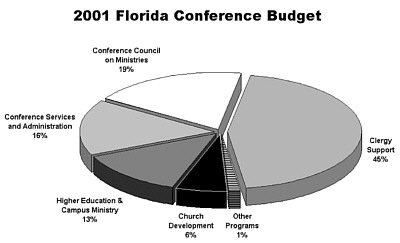General Board of Global Ministries
![]()
UM Information
UM
Reporter
![]()
Florida Southern College
![]()
Bethune
Cookman College
![]()
FL UM Children's Home
![]()
|
|
|
This
article is the first in a series dealing with apportionments in the
Florida Conference. Future articles will compare the myths and
statistics of apportionment giving and show how the Florida Conference
is doing compared to other conferences. We also invite your
contributions on the topic of apportionments. Please submit your
opinions in writing to "The United Methodist Review," P.O.
Box 3767, Lakeland, FL 33802, or by e-mail to MWacht@flumc.org.
Selected submissions will be published in a future Edition.
By Michael Wacht LAKELAND — At charge conference, each pastor is asked to report on how he or she has performed his or her pastoral duties and administered "the temporal affairs of the congregation," according to paragraph 331 of the "1996 United Methodist Book of Discipline." In the same way a local church balances the call to ministry with the need to operate in the secular world of bills and bank balances, the Florida Conference must also strike a balance between its ministry and business operations, according to Dr. Randy Casey-Rutland, conference treasurer. The Rev. Robert Standifer, pastor of First United Methodist Church, Jupiter-Tequesta, and chairman of the Conference Council on Finance and Administration (CF&A), said the conference has to have both ministry and administration. "One drives the other," he said. "Ministry drives the administration…we administer the funds people have given for other areas of ministry." Local churches rely on weekly giving by members to pay their bills and support their ministries. The Florida Conference relies on local churches to give their apportionments, so it can pay its bills and support ministries. According to Casey-Rutland, a "sizable portion" of apportionment money pays for items directly related to clergy support. "As a business, the church has an employee, a senior-level employee, who receives certain benefits in addition to a salary," he said. Among those benefits are health care and vacation. "Should your pastor become disabled, apportionment money helps pay for that insurance coverage," Casey-Rutland said. Health insurance coverage is also available for retired pastors. Items budgeted under a new "Clergy Support" heading approved Oct. 5 at the special Annual Conference session relate to the cost of clergy benefits and administration, including district superintendents’ salaries and Board of Ordained Ministry expenses. The Board recruits, enlists, examines and supports pastors and others ordained in the conference. The total cost of clergy support is more than $5 million for 2001. Staff are needed to administer those clergy benefits, conference programs and finances. "The billing for insurance, the cost of the financial workings of the conference…accounting for and auditing nearly $30 million worth of financial transactions, there’s a cost to administering all of that," Casey-Rutland said. "You also have to have a place to do that from, but you have to pay for that space." Casey-Rutland said the apportionment money under the "Conference Services and Administration" heading pays for the conference’s e-mail network, toll-free telephone number, building maintenance and repair, utilities, and property and casualty insurance. "These costs are apportioned and provide indirect support for all conference activities," he said. The "Church Development" budget lines represent an investment by the conference in its own future, according to Casey-Rutland. "The conference makes a big investment in new church starts with the belief that those churches will become contributing members of the apportionment system," he said. The apportionment money that covers expenses of the Life Enrichment Center and Warren W. Willis Youth Camp in Leesburg are both business- and ministry-related. While maintaining the facilities is a "substantial investment," the facilities also host "many activities that benefit the local churches…summer camp, Women’s Retreat, United Methodist Men’s retreats," according to Casey-Rutland. Much of the remainder of the conference’s apportionments, more than $3.7 million, goes toward ministry, including the Conference Council on Ministries’ (CCOM) $2 million budget. "Under the CCOM, the summer camps line goes to benefit children and youth," Casey-Rutland said. "We provide free copies of ‘The United Methodist Review,’ but they’re not free." Other CCOM funds provide grants for local church ministries, money to respond to disasters throughout the conference and training for laity and clergy. Under "Other Programs," the Board of Lay Ministry provides training and mission support for conference laity, while the Counseling Network offers pastors a resource for personal counseling and helps them connect church members with qualified counselors in their area. Other ministries not part of the CCOM also benefit Florida United Methodists. "Anyone who attends a college or university in the Florida Conference and goes to the Wesley Foundation on that campus benefits," Casey-Rutland said. "We’re spending $90,000 on Operation Evangelization. That and New Church Development have had a positive effect on church membership growth in the last few years." Standifer says that while administration and programs are both part of the larger ministry, the conference must constantly review the "ratio between ministry and administration" to maintain a realistic balance. "Are we spending the money, these gifts people give us, wisely?" he said. "Are we meeting the needs where we’re called to be? Behind all of that is accountability. Is the conference and CF&A accountable in these two major areas?" CF&A is currently working on a plan to develop more accountability among the various ministries and agencies of the conference. "The different groups and agencies who make up the conference budget need to come to CF&A and defend how they’re spending their money," Standifer said. "CF&A has the responsibility to know where the money is going." Top
of this page |

